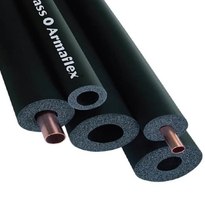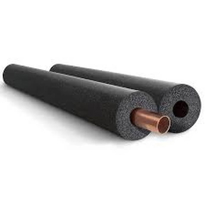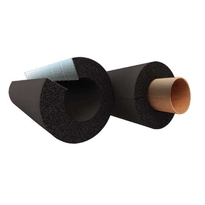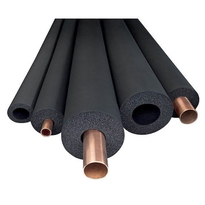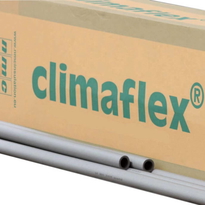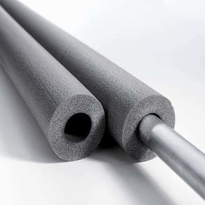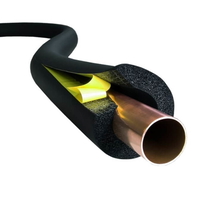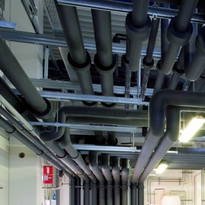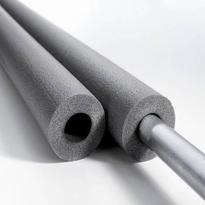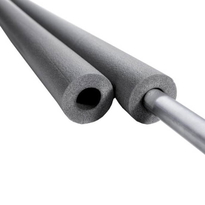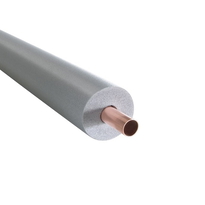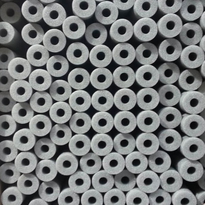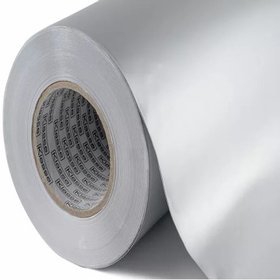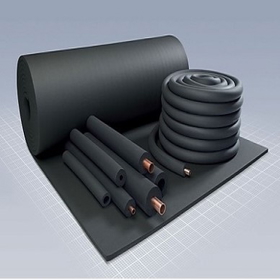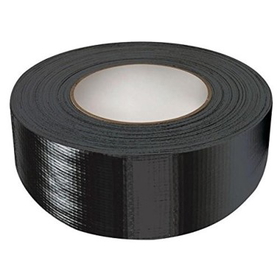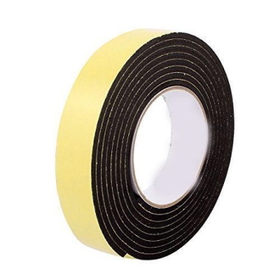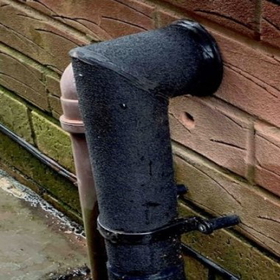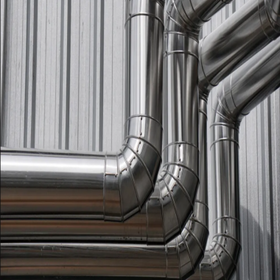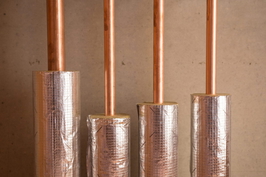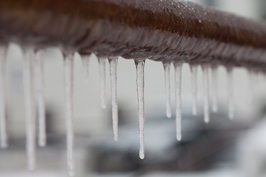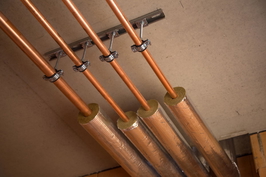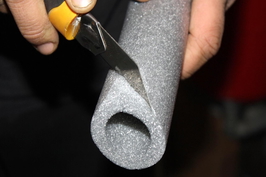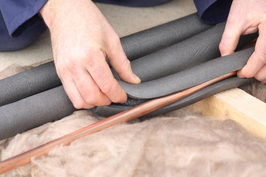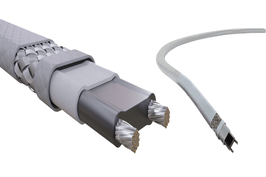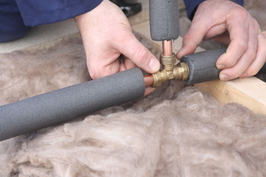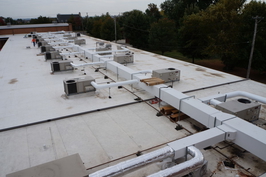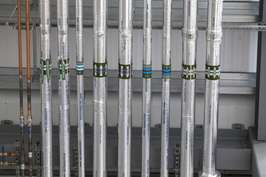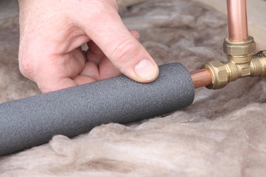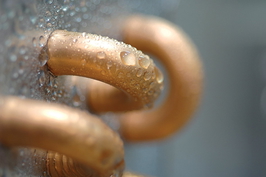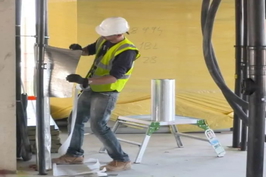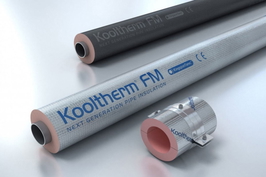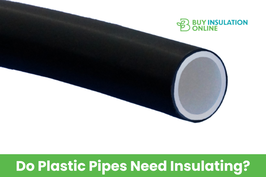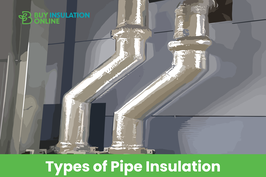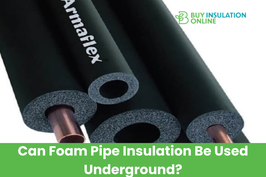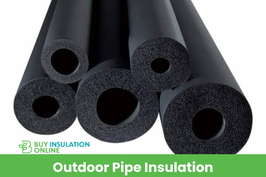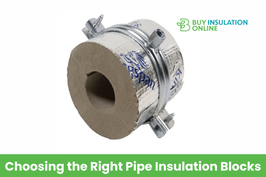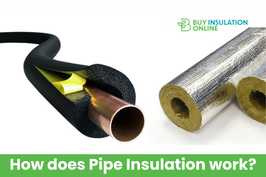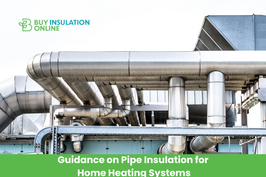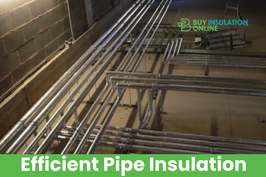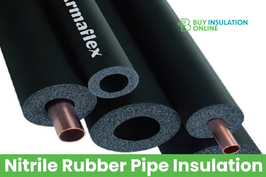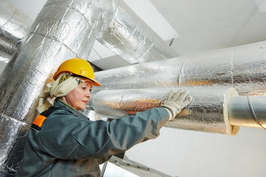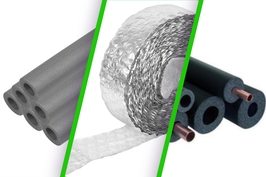Foam Pipe Insulation
Our range includes foam pipe insulation in various sizes, including 22mm options, ensuring a perfect fit for different pipe sizes. By effectively insulating your pipework, you can prevent condensation, lower energy consumption, and extend the lifespan of your heating and plumbing systems. Pre-slit foam pipe lagging makes installation quick and hassle-free, saving time and effort on site.
Explore our collection of pipe insulation solutions to insulate and protect your plumbing systems. With fast UK delivery and competitive pricing, our foam pipe lagging helps you minimise heat loss and enhance energy efficiency with ease.
Similar Categories
Foam Pipe Insulation: A Guide to Choosing and Installing the Right Product
Foam pipe insulation is a type of insulation that is designed to reduce heat loss or gain, prevent condensation, and protect pipes from freezing or bursting. Foam pipe insulation is made of various materials, such as polyethene, nitrile rubber, phenolic foam, or elastomeric foam. Foam pipe insulation can be used for various applications, such as heating, ventilation, air conditioning, plumbing, refrigeration, or industrial processes.
In this article, we will guide you through the benefits, types, and installation methods of foam pipe insulation. We will also introduce you to some of the best products available on the market, which you can buy online from our website, Buy Insulation Online.
Benefits of Foam Pipe Insulation
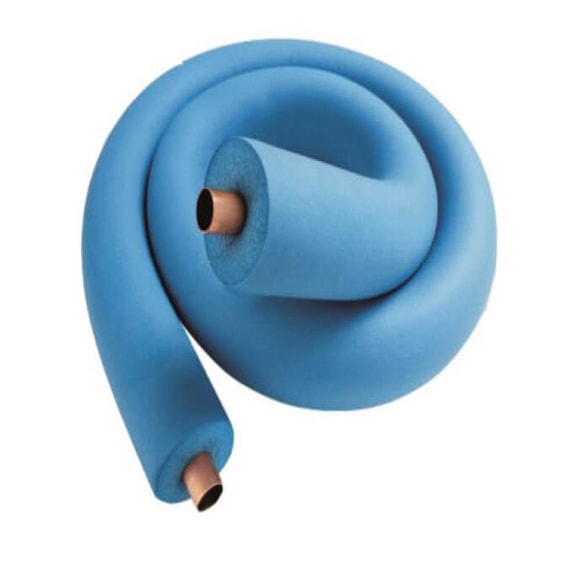 Foam pipe insulation can provide many advantages for your home or business, such as:
Foam pipe insulation can provide many advantages for your home or business, such as:
- Energy efficiency: Foam pipe insulation can reduce the amount of heat that escapes or enters your pipes, which can lower your energy bills and carbon footprint. For example, according to the Energy Saving Trust, insulating your hot water pipes can save you up to £10 per year on your energy bills.
- Condensation control: Foam pipe insulation can prevent moisture from forming on the surface of your pipes, which can cause corrosion, mould, or bacterial growth. Condensation can also damage your walls, ceilings, or floors, and create a health hazard for you and your family. Foam pipe insulation can keep your pipes at a constant temperature and prevent condensation from occurring.
- Freeze protection: Foam pipe insulation can protect your pipes from freezing or bursting in cold weather, which can cause costly damage and disruption to your water supply. Foam pipe insulation can keep your pipes above the freezing point and prevent them from cracking or splitting.
- Noise reduction: Foam pipe insulation can reduce the noise that is generated by your pipes, such as water flow, vibration, or expansion. Foam pipe insulation can absorb the sound waves and create a quieter environment for you and your neighbours.
- Fire safety: Foam pipe insulation can also provide fire protection for your pipes, depending on the material and the rating. Some foam pipe insulation products are classified as Class O, which means they have a low surface spread of flame and a low heat release rate. Some foam pipe insulation products are also self-extinguishing, which means they will not support combustion or spread fire.
Types of Foam Pipe Insulation
Foam pipe insulation comes in different shapes, sizes, and materials, depending on your needs and preferences. Here are some of the most common types of foam pipe insulation:
- Polyethylene foam pipe insulation: Polyethylene foam pipe insulation is one of the most economical and widely used types of foam pipe insulation. Polyethylene foam pipe insulation is made of closed-cell foam, which means it has tiny air bubbles that are trapped inside the material. Polyethylene foam pipe insulation is lightweight, flexible, and easy to install. Polyethylene foam pipe insulation is suitable for low-temperature applications, such as domestic hot and cold water pipes, condensate pipes, or refrigeration pipes. Polyethylene foam pipe insulation is also resistant to moisture, chemicals, and UV rays. However, polyethylene foam pipe insulation is not very durable, and it has a low fire rating. Polyethylene foam pipe insulation can also degrade over time due to exposure to heat or oxygen.
- Nitrile rubber foam pipe insulation: Nitrile rubber foam pipe insulation is another popular type of foam pipe insulation. Nitrile rubber foam pipe insulation is also made of closed-cell foam, but it has a higher density and a higher thermal conductivity than polyethylene foam pipe insulation. Nitrile rubber foam pipe insulation is more durable, flexible, and resistant to abrasion, puncture, and tear. Nitrile rubber foam pipe insulation is also suitable for high-temperature applications, such as heating, ventilation, air conditioning, or industrial processes. Nitrile rubber foam pipe insulation is also resistant to oil, grease, and ozone. However, nitrile rubber foam pipe insulation is more expensive and heavier than polyethene foam pipe insulation. Nitrile rubber foam pipe insulation can also emit a strong odour, and it can be affected by sunlight or solvents.
- Phenolic foam pipe insulation: Phenolic foam pipe insulation is a type of foam pipe insulation that is made of phenolic resin, which is a synthetic polymer. Phenolic foam pipe insulation is also a closed-cell foam, but it has a very low thermal conductivity and a very high fire rating. Phenolic foam pipe insulation is one of the most energy-efficient and fire-safe types of foam pipe insulation. Phenolic foam pipe insulation is suitable for high-temperature applications, such as heating, ventilation, air conditioning, or industrial processes. Phenolic foam pipe insulation is also resistant to moisture, chemicals, and fungi. However, phenolic foam pipe insulation is more expensive and harder to install than polyethene or nitrile rubber foam pipe insulation. Phenolic foam pipe insulation can also shrink or crack over time due to thermal cycling or mechanical stress.
- Elastomeric foam pipe insulation: Elastomeric foam pipe insulation is a type of foam pipe insulation that is made of synthetic rubber, such as EPDM, SBR, or CR. Elastomeric foam pipe insulation is also a closed-cell foam, but it has a higher elasticity and a higher resistance to water vapour diffusion than polyethylene, nitrile rubber, or phenolic foam pipe insulation. Elastomeric foam pipe insulation is very flexible, durable, and easy to install. Elastomeric foam pipe insulation is suitable for high-temperature applications, such as heating, ventilation, air conditioning, or industrial processes. Elastomeric foam pipe insulation is also resistant to oil, grease, and ozone. However, elastomeric foam pipe insulation is more expensive and heavier than polyethylene or nitrile rubber foam pipe insulation. Elastomeric foam pipe insulation can also emit a strong odour, and it can be affected by sunlight or solvents.
Installation Methods of Foam Pipe Insulation
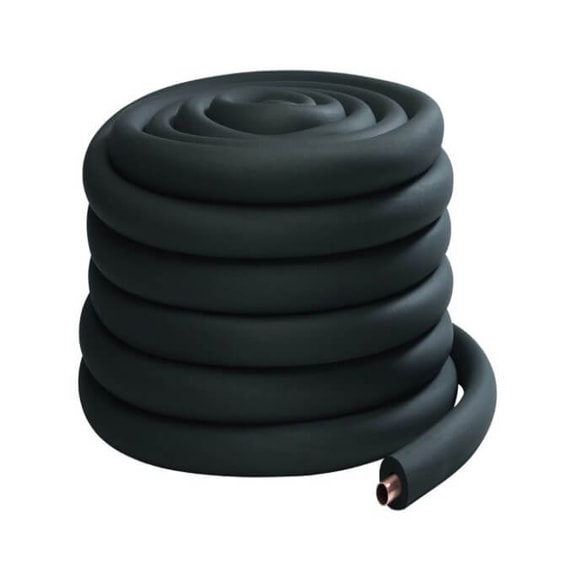 Foam pipe insulation can be installed in different ways, depending on the type, shape, and size of the product. Here are some of the most common installation methods of foam pipe insulation:
Foam pipe insulation can be installed in different ways, depending on the type, shape, and size of the product. Here are some of the most common installation methods of foam pipe insulation:
- Pre-slit foam pipe insulation: Pre-slit foam pipe insulation is a type of foam pipe insulation that comes in cylindrical tubes that are already cut along the length. Pre-slit foam pipe insulation is easy to install, as you just need to wrap it around the pipe and seal the slit with tape, glue, or clips. Pre-slit foam pipe insulation is suitable for straight pipes or pipes with small bends. However, pre-slit foam pipe insulation is not very secure, and it can come loose or fall off over time. Pre-slit foam pipe insulation can also leave gaps or seams that can reduce the insulation performance or allow moisture to enter.
- Self-seal foam pipe insulation: Self-seal foam pipe insulation is a type of foam pipe insulation that comes in cylindrical tubes that have an adhesive strip along the slit. Self-seal foam pipe insulation is also easy to install, as you just need to wrap it around the pipe and press the adhesive strip to seal the slit. Self-seal foam pipe insulation is more secure and durable than pre-slit foam pipe insulation, as it creates a tight and seamless fit around the pipe. Self-seal foam pipe insulation is also suitable for straight pipes or pipes with small bends. However, self-seal foam pipe insulation is more expensive and harder to remove than pre-slit foam pipe insulation. Self-seal foam pipe insulation can also lose its adhesion over time due to temperature changes or moisture.
- Coil foam pipe insulation: Coil foam pipe insulation is a type of foam pipe insulation that comes in long rolls that can be cut to the desired length. Coil foam pipe insulation is more versatile and economical than pre-slit or self-seal foam pipe insulation, as you can use it for different pipe sizes and shapes. Coil foam pipe insulation is suitable for curved pipes or pipes with large bends. However, coil foam pipe insulation is harder to install than pre-slit or self-seal foam pipe insulation, as you need to measure, cut, and wrap it around the pipe and secure it with tape, glue, or clips. Coil foam pipe insulation can also leave gaps or seams that can reduce the insulation performance or allow moisture to enter.
- Sheet foam pipe insulation: Sheet foam pipe insulation is a type of foam pipe insulation that comes in flat sheets that can be cut and shaped to fit the pipe. Sheet foam pipe insulation is the most flexible and customizable type of foam pipe insulation, as you can use it for any pipe size, shape, or configuration. Sheet foam pipe insulation is suitable for irregular pipes or pipes with complex fittings. However, sheet foam pipe insulation is the most difficult and time-consuming to install than other types of foam pipe insulation, as you need to measure, cut, and mould it around the pipe and secure it with tape, glue, or clips. Sheet foam pipe insulation can also leave gaps or seams that can reduce the insulation performance or allow moisture to enter.
Best Products of Foam Pipe Insulation
At Buy Insulation Online, we offer a wide range of foam pipe insulation products that can suit your needs and preferences. Here are some of the best products of foam pipe insulation that you can buy online from our website:
- Armaflex Pipe Insulation: Armaflex pipe insulation is a type of nitrile rubber foam pipe insulation that is one of the most popular and trusted brands in the market. Armaflex pipe insulation is durable, flexible, and resistant to moisture, oil, and ozone. Armaflex pipe insulation is also classified as a Class O fire rating, which means it has a low surface spread of flame and a low heat release rate. Armaflex pipe insulation is suitable for high-temperature applications, such as heating, ventilation, air conditioning, or industrial processes. Armaflex pipe insulation comes in different forms, such as:
- Armaflex Pipe Insulation 15m Coils: This is a type of coil foam pipe insulation that comes in long rolls that can be cut to the desired length. This product is ideal for large-scale projects or continuous pipe runs. This product has a wall thickness of 9mm, 13mm, or 19mm, and a diameter range of 15mm to 114mm.
- Armaflex Pipe Insulation Nitrile Rubber Black Pipe Lagging: This is a type of pre-slit foam pipe insulation that comes in cylindrical tubes that are already cut along the length. This product is ideal for small-scale projects or individual pipe sections. This product has a wall thickness of 9mm, 13mm, or 19mm, and a diameter range of 15mm to 114mm.
- Armaflex Pipe Insulation Self Seal: This is a type of self-seal foam pipe insulation that comes in cylindrical tubes that have an adhesive strip along the slit. This product is ideal for quick and easy installation or repair. This product has a wall thickness of 9mm, 13mm, or 19mm, and a diameter range of 15mm to 114mm.
- Armaflex Sheet Insulation: This is a type of sheet foam pipe insulation that comes in flat sheets that can be cut and shaped to fit the pipe. This product is ideal for irregular pipes or pipes with complex fittings. This product has a wall thickness of 6mm, 9mm, 13mm, or 19mm, and a sheet size of 2m x 1m.
- Armaflex Ultima: This is a type of nitrile rubber foam pipe insulation that has a higher fire rating and a lower smoke density than the standard Armaflex pipe insulation. This product is ideal for high-risk applications, such as public buildings, hospitals, or schools. This product has a wall thickness of 9mm, 13mm, or 19mm, and a diameter range of 15mm to 114mm.
- Kingspan Kooltherm Pipe Insulation: Kingspan Kooltherm pipe insulation is a type of phenolic foam pipe insulation that is one of the most energy-efficient and fire-safe types of foam pipe insulation. Kingspan Kooltherm pipe insulation is durable, rigid, and resistant to moisture, chemicals, and fungi. Kingspan Kooltherm pipe insulation is also classified as Class O fire rating, which means it has a low surface spread of flame and a low heat release rate. Kingspan Kooltherm pipe insulation is suitable for high-temperature applications, such as heating, ventilation, air conditioning, or industrial processes. Kingspan Kooltherm pipe insulation comes in cylindrical tubes that are covered with an aluminium foil facing that provides a vapour barrier and a reflective surface. Kingspan Kooltherm pipe insulation has a wall thickness of 15mm, 20mm, 25mm, or 30mm, and a diameter range of 15mm to 219mm. You can buy Kingspan Kooltherm Aluminium-Faced Class O Phenolic Pipe Insulation in all sizes from our website.
- K-Flex Pipe Insulation: K-Flex pipe insulation is a type of elastomeric foam pipe insulation that is one of the most flexible and easy-to-install types of foam pipe insulation. K-Flex pipe insulation is durable, flexible, and resistant to moisture, oil, and ozone. K-Flex pipe insulation is also classified as Class O fire rating, which means it has a low surface spread of flame and a low heat release rate. K-Flex pipe insulation is suitable for high-temperature applications, such as heating, ventilation, air conditioning, or industrial processes. K-Flex pipe insulation comes in different forms, such as:
- K-Flex Self Seal Elastomeric Nitrile Rubber Pipe Insulation : This is a type of self-seal foam pipe insulation that comes in cylindrical tubes that have an adhesive strip along the slit. This product is ideal for quick and easy installation or repair. This product has a wall thickness of 9mm, 13mm, 19mm, or 25mm, and a diameter range of 15mm to 114mm.
- K-Flex Nitrile Rubber Sheet: This is a type of sheet foam pipe insulation that comes in flat sheets that can be cut and shaped to fit the pipe. This product is ideal for irregular pipes or pipes with complex fittings. This product has a wall thickness of 6mm, 9mm, 13mm, or 19mm, and a sheet size of 2m x 1m.
- Climaflex Pipe Insulation: Climaflex pipe insulation is a type of polyethene foam pipe insulation that is one of the most economical and widely used types of foam pipe insulation. Climaflex pipe insulation is lightweight, flexible, and easy to install. Climaflex pipe insulation is suitable for low-temperature applications, such as domestic hot and cold water pipes, condensate pipes, or refrigeration pipes. Climaflex pipe insulation is also resistant to moisture, chemicals, and UV rays. Climaflex pipe insulation comes in different forms, such as:
- Climaflex Pipe Insulation 1m Foam Pipe Lagging: This is a type of pre-slit foam pipe insulation that comes in cylindrical tubes that are already cut along the length. This product is ideal for small-scale projects or individual pipe sections. This product has a wall thickness of 9mm, 13mm, or 19mm, and a diameter range of 15mm to 114mm.
- Condensate Pipe Insulation Pre-Slit: This is a type of pre-slit foam pipe insulation that comes in cylindrical tubes that are already cut along the length. This product is ideal for condensate pipes that are exposed to low temperatures and need to be protected from freezing or bursting. This product has a wall thickness of 9mm and a diameter of 22mm.
- Primary Pro Pipe Insulation: Primary Pro pipe insulation is a type of polyethene foam pipe insulation that is specially designed for primary school pipework. Primary Pro pipe insulation is colourful, fun, and educational, as it comes in different colours that represent different subjects, such as maths, science, or art. Primary Pro pipe insulation is also durable, flexible, and easy to install. Primary Pro pipe insulation is suitable for low-temperature applications, such as domestic hot and cold water pipes, condensate pipes, or refrigeration pipes. Primary Pro pipe insulation is also resistant to moisture, chemicals, and UV rays. Primary Pro pipe insulation comes in cylindrical tubes that have a wall thickness of 13mm, and a diameter range of 15mm to 28mm. You can buy Primary Pro Pipe Insulation from our website.
- Armacell Tubolit Polyethylene Foam Pipe Insulation All Sizes: This is a type of polyethene foam pipe insulation that is similar to Climaflex pipe insulation, but it has a higher density and a higher thermal conductivity. Armacell Tubolit pipe insulation is durable, flexible, and easy to install. Armacell Tubolit pipe insulation is suitable for low-temperature applications, such as domestic hot and cold-water pipes, condensate pipes, or refrigeration pipes. Armacell Tubolit pipe insulation is also resistant to moisture, chemicals, and UV rays. Armacell Tubolit pipe insulation comes in cylindrical tubes that have a wall thickness of 9mm, 13mm, or 19mm, and a diameter range of 15mm to 114mm.
Conclusion
We hope this article has helped you understand the benefits, types, and installation methods of foam pipe insulation. If you are looking for high-quality and affordable foam pipe insulation products, you can browse our website, Buy Insulation Online, and order online. We offer fast and free delivery, and we have a friendly and knowledgeable customer service team that can assist you with any queries or issues. Thank you for choosing Buy Insulation Online, your one-stop shop for all your insulation needs.
Frequently Asked Questions
Q: What is foam pipe insulation?
A: Foam pipe insulation is a type of thermal insulation used to minimize heat loss and protect pipes from freezing. It comes in the form of foam tubes that wrap around pipes to provide insulation and energy efficiency.
Q: What are the benefits of using foam pipe insulation?
A: Foam pipe insulation helps conserve energy by reducing heat loss from pipes, prevents freezing during cold weather, and minimizes the risk of condensation forming on the pipes. It also provides acoustic insulation, reducing noise from the pipes.
Q: What types of pipe can be insulated with foam pipe insulation?
A: Foam pipe insulation can be used to insulate a variety of pipes, including plumbing pipes, HVAC pipes, and outdoor water pipes. It is suitable for both hot and cold water pipes.
Q: How do I choose the right foam pipe insulation for my needs?
A: Consider factors such as the diameter and thickness of your pipes, the environmental conditions, and the specific insulation requirements. Consult with a professional if you are unsure about the right type of foam pipe insulation for your application.
Q: What are the different types of foam pipe insulation available?
A: There are various types of foam pipe insulation, including polyethene foam, rubber foam, and nitrile rubber foam (such as Armaflex). Each type has different properties and is suitable for specific applications.
